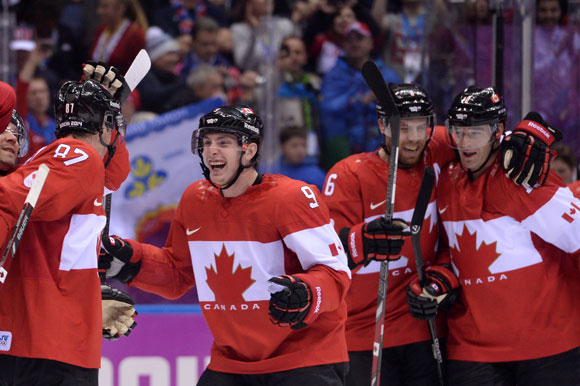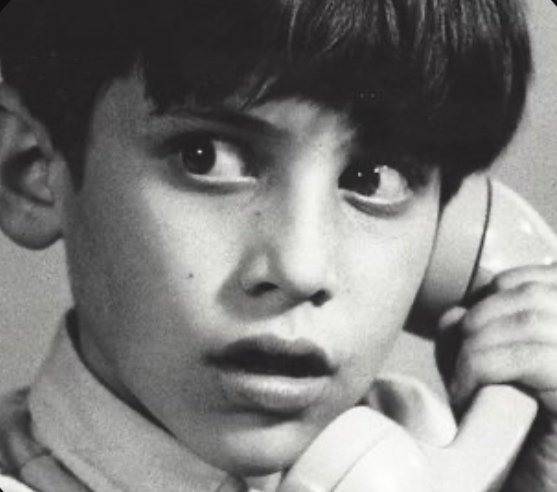Canada’s Shot at Gold: From the Girls to the Boys
/The Olympic semifinal between the U.S. and Canada was—and I know I will pay for these words—like a classic World Cup soccer game: close and low-scoring without ever being dull, it revealed, over several periods of probing, the hidden strengths and weaknesses in two otherwise equal teams. (And I will pay for those words, I mean, among those who hate any comparison between tough hockey and sissy, “feminized” soccer.) Though it lacked the melodrama of yesterday’s tilt by the women, it was about as well played as a hockey game could be. Canada moves on to face Sweden in the final on Sunday; the Swedes are a strong team, with a history of winning big tournaments, but Canada ought to be able to take the gold.
The notion, aired by my good friend Nick Paumgarten, that the game would have been better if it had been played on a smaller ice surface—as one more strangled Bettman-era roller derby on ice—is just, well, let’s not go there. That intelligent hockey lovers can have eyes and souls sufficiently corrupted to prefer the N.H.L. variant to the real thing reminds me of Alexander Pope’s lines on vice: “Vice is a monster of such hideous mien/that to be hated needs but to be seen/But seen too oft, familiar with her face/we first endure, then pity, then embrace.” Anyone who watched the Soviets play the Canadians in the seventies knows what hockey can be, and wants it back that way again. We can pity the contemporary N.H.L. game, and sometimes endure it, but we must not embrace it. When, as I pointed out yesterday, even Phil Mushnick—Phil Mushnick!—can pick up on how much better the Olympic game is, you can be sure that people are seeing something real. Anyway, no one disputes that North Americans can play great and stylish hockey. The trouble is that the N.H.L. rarely gives them the chance.
For connoisseurs of great defensemen—not for great defensive hockey, precisely, in the Devilish mode, but for talented individuals making great plays—this was one of the finest vintages ever offered. I still think Canada erred in keeping P. K. Subban on the bench, but I am probably the only one who does. Certainly, the big three of Duncan Keith, Drew Doughty, and Shea Weber (with Jay Bouwmeester and Marc-Edouard Vlasic not too far behind) can take their place alongside the defensemen on the 1976 Canada Cup squad—the Habs’ Big Three, plus Denis Potvin and Bobby Orr, in his last hurrah—as the best group to represent Canada in international hockey. It was astonishing to watch the Americans skate in and set up, seemingly full of plans to stay—only to see the puck neatly swept up, aside, and back into play by the Canadian defense. With both goalies playing well this tournament—Canada’s Carey Price in his focussed, technical manner; the American Jonathan Quick, like a character from a Restoration comedy, living up to his name—it was the blue-liners who made the difference. Sidney Crosby aside, the Canadian forwards, I would stubbornly insist, are by historical standards sub-par. Compared with the ’76 team, with Marcel Dionne, Guy Lafleur, and Darryl Sittler all dominant, or the 1987 one, with Wayne Gretzky and Mario Lemieux both in their prime (and Mark Messier up there, too), this Olympic team seems more than a little underpowered. (Chris Kunitz? He had his chances but…really? Chris Kunitz?)
This game missed the incomparable emotional intensity of the women’s final on Thursday. (And it seemed, on the whole, better tempered: at the final horn, both the losing American and the victorious Canadian women looked angry; I have rarely seen a more reluctant hockey handshake.) I’m sure that there will be Americans disappointed at the loss, but if it’s any consolation, an American watching her team lose in international hockey just can’t compare, for emotional weight, with a Canadian watching her team win. Hockey is Canada—it just is—and the sense of pleasure flooding over my homeland was palpable today, represented by a steady stream of e-mails and texts and phone calls. You could practically feel it, as tangibly as any polar vortex. (That cold north wind that blew across the city around 3 P.M.? The exhalation of relieved Canadians.)
Even more than today’s solid showing, even more than yesterday’s unforgettable win—and even if Canada brings home a second gold medal in hockey after Sunday’s game against Sweden—what I suspect will go down in Canadian history is the message the core of the women’s team left in the men’s locker room before the semifinal: “Tonight is yours. Own the moment. We are proof that every minute matters. The podium is reserved for the brave. Earn every inch. Dictate the pace. Go get em! From the girls!” There’s something beautifully Canadian about the juxtaposition of the big rhetorical flourishes and the modest descant of that “from the girls.”
Photograph by Andrej Isakovic/AFP/Getty


